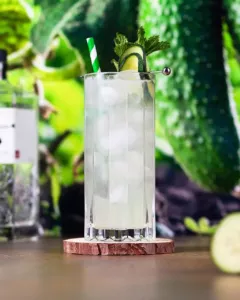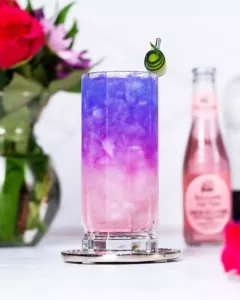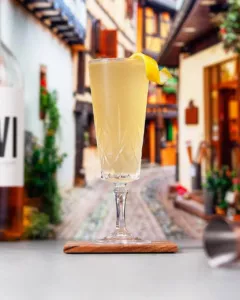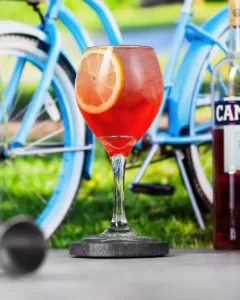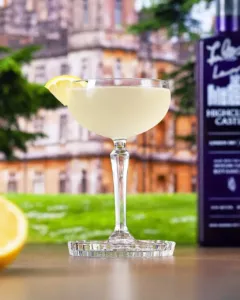Disclosure: This is an honest review written based on my experience using this book to make cocktails. Although I was not compensated to write this review, this post contains affiliate links. See my disclosure policy here.
About The Book
This post contains affiliate links, meaning we make a small commission each time you purchase a product using our links. Product images sourced from Amazon Product Advertising API. Amazon affiliate links last updated on 2025-06-30.
The Geeky Bartender Drinks: Real-Life Recipes for Fantasy Cocktails is a 160-page recipe book that was written by Cassandra Reeder, a Portland, Oregon-based blogger and home cook known as “The Geeky Chef.” The book is filled with about seventy cocktails inspired by fictional works, including books, movies, shows, and games.
The drinks are organized into eight sections beginning with an introduction from the author along with tips for getting started. They’re then listed by type—Otherworldly Intoxicants, Magical Elixirs, Sci-Fi Spirits, Culty Cocktails, Literary Libations, Dystopian Potions, Comedic Concoctions, and Non-Alcoholic Beverages—so you can choose which you want to try loosely based on fandom.
Features:
• 69 cocktail recipes with ingredient lists, methods, suggest glassware, and brief descriptions of each cocktail
• Beautifully styled photos of almost all of the cocktails
• An introduction and tips for getting started from the author
• A liquid measurement conversion chart
• 10 simple syrup recipes
• 10 special effect tutorials
• A table of contents that outlines the starting pages for each of the ten sections
• An index with cocktail names
Pros
The recipes are very creative.
The recipes in this book are incredibly clever and imaginative. The author did a great job of taking lots of fictional drinks from different works and creating tasty alcoholic versions; I like to imagine how fun it must have been to do recipe research and development for them.
The recipes are faithful to the works that inspired them.
The author either already knew a lot about the fictional content for which she developed the recipes, or she did a lot of research because each of the ingredients she used served a thoughtful purpose. I enjoyed learning about the inspiration for each of the recipes, as has my audience any time I’ve shared a recipe from this book. The Tatooine Sunset, Butterbeer, and Miruvor cocktails are some of the most popular drinks I’ve ever posted.
The copywriting is conversational.
The author is very good at writing about fictional works. It was clear that her drinks were made with a lot of love when reading the descriptions, and her writing style made it feel as if I was chatting with a nerdy kindred spirit about other worlds and their concoctions.
There’s a good variety of recipes.
The book includes a good mix of the different types of cocktails—shaken, stirred, built, hot, cold, etc. Plus, there’s something for every mood, which I really liked.
Bartending tutorials are included.
In addition to recipes, the book includes several other informative how-tos for basic bartending skills; I didn’t expect that of a nerdy drink book. In fact, it features an entire section called “Special Effects” that covers everything from how to rim glassware and cut a spiral citrus garnish to how to work with fire, which are tutorials that are often omitted from cocktail books in my experience.
There are virgin options listed for many recipes.
Many of the recipes in this book included a mocktail version, which I thought made it a great pick for non-alcoholic drinkers as well. There’s even a non-alcoholic drink section at the end.
The pages are well-designed.
The book is beautifully designed with styled photos inserted between almost all of the recipes. Since the cocktails are so conceptual, I was grateful that there were only three or four that didn’t have photos. I also really loved the redesigned cover of the edition I purchased; geeky iconography is right up my alley.
The index is organized by work.
Something else I found to be more helpful than expected was that the index is organized by fictional story. For example, I would be able to look up all of the Star Wars cocktails included in the book if I wanted to host a watch party and make a few recipes on theme.
Cons
The recipes don’t call for many unique ingredients.
Many of the other books I’ve read have had me searching for new spirits or liqueurs at my local liquor stores before I can try the cocktails, but almost all of the drinks in this one are made with pretty basic ingredients. I’m still glad to have purchased this book, but it did make me realize how much I truly enjoy hunting down and adding new ingredients to my collection.
Most of the recipes are very simple.
My palates is more developed than the average person’s at this point, so I tend to gravitate toward drinks that make me contemplate their many flavors; there were few that offered that experience in this book. Although tasty, it was obvious that almost all of the recipes were made to be palatable to anyone regardless of palate.
The recipes are too conceptual at times.
Most of the drinks in this book are built around the concept and not necessarily the taste. Some also seem to have been created to have a certain look or contain a certain set of ingredients. In my experience, creating cocktails this way doesn’t always lead to the most complexity or balance. The Tatooine Sunset is a good example of this; it’s a beautifully layered drink that is pretty one-note in taste when the ingredients are mixed together.
The types of measurements were inconsistent throughout the book.
This was really only the case when citrus juice was used, but some of this book’s recipes called for the juice of one lime or one lemon instead of listing an actual measurement for the juice. Since citruses, limes especially, can vary in size and their juices can affect the cocktail’s balance so much, it was harder to get the taste right without a specific measurement.
There’s no ingredient index.
I’ve found that most recipe books will include cocktail ingredients in their indexes in addition to the recipe titles, and I’ve used that more often than I expected. This book only includes a few syrup recipes and a few other random ingredients, so if I wanted to try just whiskey cocktails, for example, I wasn’t able to find them very quickly.
Who Should Buy This Book
This post contains affiliate links, meaning we make a small commission each time you purchase a product using our links. Product images sourced from Amazon Product Advertising API. Amazon affiliate links last updated on 2025-06-30.
In my opinion, The Geeky Bartender Drinks by Cassandra Reeder is best for readers who:
• Enjoy fictional content
• Want to read about the inspiration behind the drinks from fictional works
• Host themed get-togethers and want to make fun batch drinks
• Prefer less complex craft cocktails
• Are interested in learning more about making cocktails at home
Some might assume this book is a little kitschy, but as a fan of many of the shows, movies, and games that inspired the author’s recipes, I thought it was a fun addition to mycollection. Its recipes are thoughtfully-curated and very creative, and most are extremely easy to not only make but sip as well. I’m excited to continue exploring each fandom and believe anyone could get enjoyment out of this book even if they don’t consider themselves particularly geeky.
Cocktails From This Book
These are the recipes I liked most from this cocktail book:

Butterbeer (Harry Potter): A stout beer and spiced rum cocktail made with evaporated milk, butter, margarine, vanilla extract, brown sugar, whole cloves, whole allspice berries, cinnamon sticks, whipped cream, and nutmeg

Miruvor (The Lord of the Rings): A gin cocktail made with elderflower liqueur, white tea, honey syrup, and orange flower water

Tatooine Sunset (Star Wars): A tequila cocktail made with blue curaçao, pomegranate juice, grenadine, orange juice, lemon juice, and cherries

Noble Pursuit (The Legend of Zelda): A white rum and gin cocktail made with watermelon juice, lime juice, lavender syrup, simple syrup, and lavender bitters




